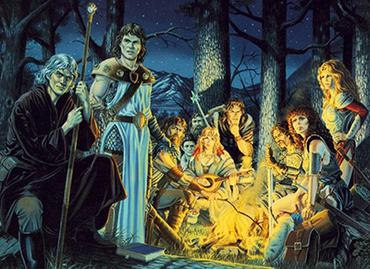A couple months ago, I discussed the importance of the group putting a "social contract" in place, preferably before play begins. This week, I wanted to focus on a key part of that discussion, determining what type of campaign that everyone wants to play: Plot v. Sandbox.
By "Plot v. Sandbox," I'm referring to how and to how much a particular campaign is scripted in advance by the GM, whether that is metaplot, side quests, other events, setting, factions and NPCs (and their goals), etc. This is a major area of fun and creativity for many GMs, myself included.
In terms of "Plot v. Sandbox," every campaign falls somewhere on the spectrum between purely plot-driven games/campaigns (whether that's certain pre-printed modules (*cough*Dragonlance*cough*) or certain New School games (e.g., a story game) or whatever) and pure sandbox campaigns (when the GM simply populates an area, and where if there's a story at all, it's emergent from actual play). A number of Old School modules and products are widely regarded as sandboxes, and often the loudest proponents of sandbox play are the grognards.
On one extreme, if the GM takes active steps to keep the players on his preferred metaplot, this is often referred to "railroading". Some players may enjoy the ride but railroading is frowned upon when the GM takes away the players' agency.
 |
| Can you hear Tracy Hickman's dice hitting the table? |
On the other extreme, if the players in a sandbox are unable to drive the action and simply wander around aimlessly, I like to call this a "desert".
I specifically wanted to highlight this issue in this blog post since it's no fun if the GM invests significant time and energy to set up a campaign and the players decide to do something completely different but it's no fun if the players are forced to follow the GM's whims.
There's no one right answer for all groups but any answer that's fun for the GM and the players may be the right answer for that group. And it is usually best to work out this issue in advance as part of the group's social contract.
In my own games, my players are prefer to leave control of the narrative to me. So, I usually come up with broad ideas and a handful of plot points and improvise the rest based on the PCs' decisions. I try leave choices up to the players as much as possible. The NPCs have their own things going on and will succeed unless the PCs decide to intervene.
If the PCs decide not to interact with something I've planned, it's not a big deal. I can usually recycle part or all of it at a later date.
Let me know what works for your games!
If the PCs decide not to interact with something I've planned, it's not a big deal. I can usually recycle part or all of it at a later date.
Let me know what works for your games!


No comments:
Post a Comment